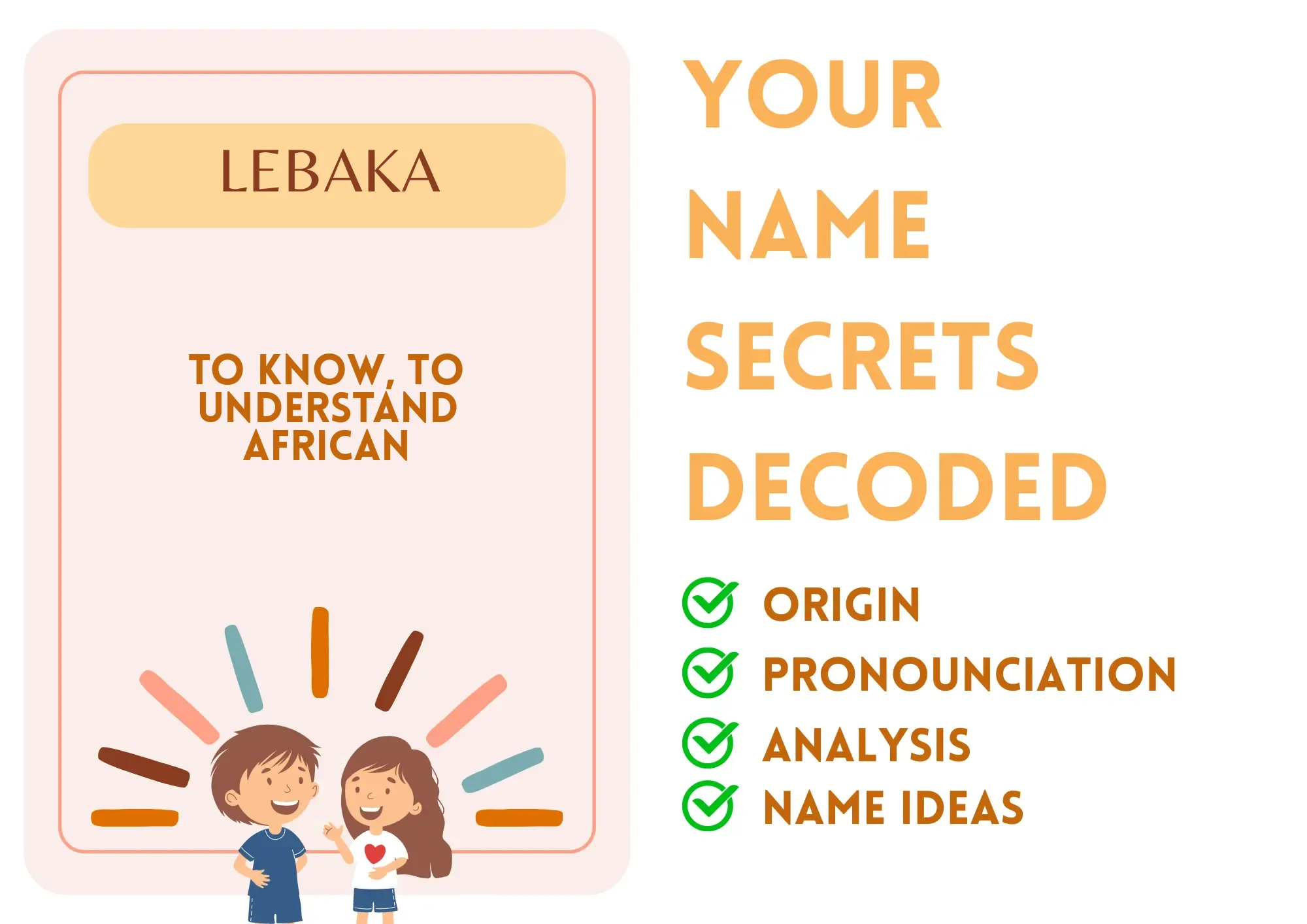
Lebaka
Lebaka is a culturally rich name of African origin, particularly found in Southern Africa, and it translates to 'to know' or 'to understand'. This name is commonly used and embodies the idea of wisdom and knowledge. While it is primarily a masculine name, it can also be used as unisex.
The cultural significance of Lebaka is rooted in the appreciation of intelligence and the quest for understanding, particularly in the context of African traditions valuing wisdom and scholarly pursuits. It is seen as an auspicious choice for a child expected to become a thinker or educator.
In terms of perception, Lebaka is generally viewed positively. It evokes a sense of intellect, guidance, and enlightenment. The name is relatively easy to write and pronounce, which enhances its appeal to parents.
Basic Information
Gender: Unisex
Sounds Like: leh-BAH-kah
Pronunciation Explanation: The emphasis is on the second syllable 'BAH', where the 'e' is pronounced as in 'let', the second syllable has a long 'a' as in 'father', and the last syllable is pronounced as 'kah'.
Summary and Meaning
Meaning: to know, to understand (African)
Origin: Lebaka has its roots in African languages, especially among the Tswana and Sotho cultures.
Usage: Lebaka is primarily considered masculine but is also used as a unisex name.
Name Number (Chaldean)
Name Number (Pythagorean)
Popularity (Global Rank)
Overall: 198074
Boys: 72681
Girls: 77177
Most Popular in
Religious and Cultural Significance
Religion: Traditional African
Background: The name carries relevance in traditional African settings where values of knowledge and wisdom are celebrated.
Cultural Significance: Lebaka connects deeply with the cultural emphasis on the importance of learning and the role of educators in the community.
Historical Significance: In African cultures, names often reflect the values and aspirations of a community. Lebaka signifies a legacy of valuing knowledge and education, which has historically been critical for the progress of many African societies.
Popular Culture
Literature and Mythology: The name has been utilized in various African folklore where characters named Lebaka are depicted as wise sages or teachers.
Movies and Television: Lebaka may not feature prominently in mainstream media but is recognized in regional storytelling and drama that celebrates African heritage.
Feelings and Perceptions
Perception: Lebaka is perceived positively, associated with wisdom and understanding. It is appreciated for its depth and cultural significance.
Positive Feelings: Intellect, wisdom, enlightening, unique, rooted in tradition, culturally rich.
Negative Feelings: May be unfamiliar to non-African communities, and some may find it challenging to pronounce correctly.
Practical Considerations
Ease of Writing and Calling: The name Lebaka is relatively easy to write and pronounce, consisting of six letters and three syllables, making it memorable.
Common Typos and Misspellings: Lebaka,Lebakka,Labaka,Leebaka
Common Nicknames: Baka,Leba
Lebaka Popularity
Lebaka Usage and Popularity By Country
| Country | Rank (Overall) |
|---|---|
| Lesotho | 745 |
| South Africa | 14988 |
| India | 108387 |
| France | 158953 |
| United Kingdom | 182431 |
Lebaka Usage and Popularity By City
| City | Rank (Overall) |
|---|---|
| Johannesburg | 18716 |
| Bloemfontein | 2783 |
| Cuddapah | 2043 |
Compatibility Analysis
Famous Persons Named Lebaka
No results found for Lebaka.
Related Names
Similar Sounding Names:
Lameka,Sedaka,Shaka